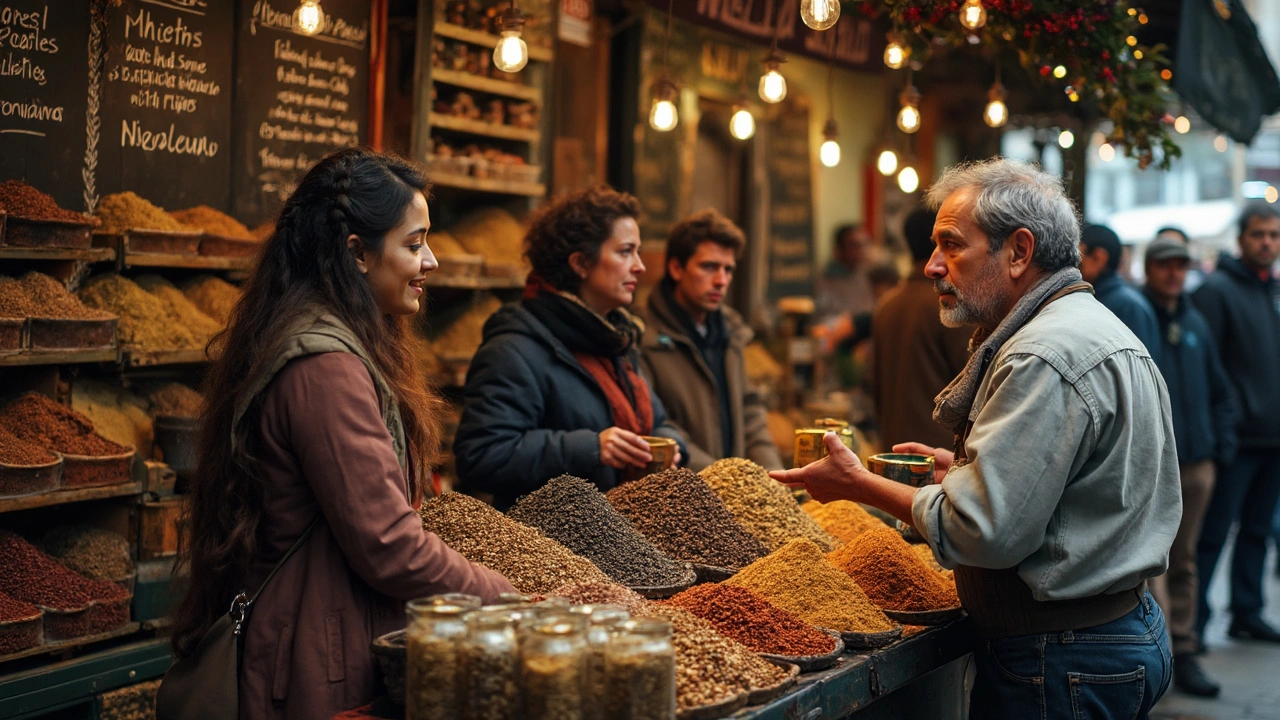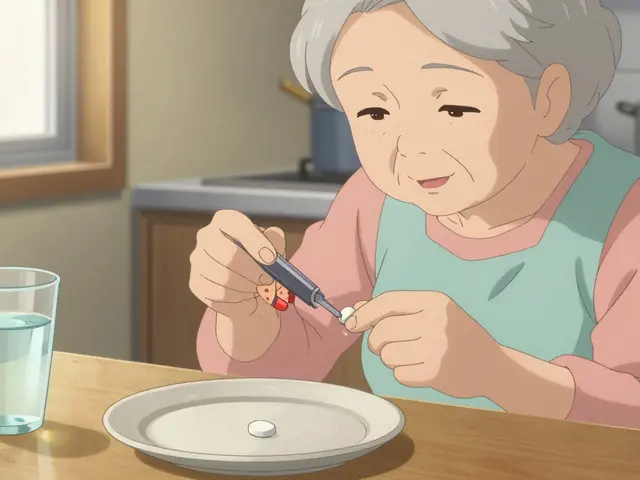The Ancient Roots: Nigella Sativa as a Time-Tested Remedy
Now, did you know that Nigella sativa, or black seed, was found in the tomb of Tutankhamun? Ancient Egyptians didn’t mess around when it came to their afterlife go-bags, so if it made the cut, it was serious business. Nigella sativa, those little black seeds you might see sprinkled over flatbread in Middle Eastern bakeries, has been part of traditional medicine cabinets for thousands of years. And I mean cabinets from Egypt to Persia, India to the Roman world—everyone had their hands in this jar.
Old herbal texts from the Middle East say black seed was used to “cure everything but death.” That’s a pretty hefty promise, but when you start reading through some of those papyrus scrolls, it turns out they used it for things like asthma, colds, digestive problems, headaches, and skin conditions. It wasn’t just an Egyptian thing. Across the Arabian Peninsula, black seed oil figured heavily in Islamic medicine after the Prophet Muhammad reportedly dubbed it the ‘seed of blessing.’ Even Avicenna, the legendary Persian physician, praised it in his Canon of Medicine. He noted it helped boost energy and recovery from fatigue—long before anyone thought of running marathons for fun.
The seeds traveled with traders and conquerors, popping up in Ayurvedic texts from India where they found a totally different set of applications: joint pain, detox, and regulating menstrual cycles (side note: if you’ve ever tried to read Ancient Sanskrit medical texts, let’s just say you need patience and strong tea). In ancient Greece and Rome, writers noted black seed in concoctions for toothaches, congestion, and even as a preservative for food and oils. That’s dedication.
One thing people sometimes miss: Respect for Nigella sativa wasn’t just about the seed itself, but also the oil pressed from it, which takes center stage in a lot of Middle Eastern home remedies even now. Those golden drops found their way onto wounds, into tinctures, and as a finishing oil for food—a practical show of how one plant could be woven into daily life.
The use kept evolving. During the Middle Ages, European herbalists picked up the torch and mixed black seed with honey for cough syrup, or ground it into pastes for skin conditions. It even found its way into Jewish healing traditions, sometimes called “ketzach” in the Bible. My grandmother in Wales swore by a black seed and honey blend to ward off winter colds. If you’ve ever felt a tingle at the back of your throat, that spicy, almost peppery warmth from a teaspoon of black seed oil sticks with you.
It wasn’t all about medicine either. Black seed was (and is) a regular in the kitchen. Sprinkled over naan or folded into cheese, it’s sharp, nutty flavor brightens food and serves the bonus purpose of improving digestion—a traditional tip you've probably never gotten from any dietician today. And the resilient nature of Nigella sativa, thriving in dry, hot climates, can explain how it became a constant across desert and fertile valleys alike. That hardiness, some believed, symbolized protection and stamina, which likely layered an extra magic onto its medical uses.
With such a winding history sprawled over continents, it’s no wonder black seed carries a kind of legendary vibe. Each culture stamped their own beliefs and uses onto it, making it one of those rare remedies that feels familiar in so many different languages. Not many plants can boast such a resume—Imhotep, Galen, Avicenna, and the folks at my gran’s kitchen table all agreed it was worth keeping around. If ancient wisdom counts for anything, Nigella sativa set the bar for what it means to stick in human memory.

Folk Wisdom Meets Modern Science: Black Seed Oil in Today’s World
Zoom out from ancient pyramids and you’ll find black seed oil lining shelves in modern health stores and pharmacies. It’s rebranded, for sure, with snappier packaging and catchier slogans, but at its heart, it’s as old school as remedies get. Why the comeback? Turns out, what folks intuited about those tiny seeds centuries ago, is now getting a nod from science labs and wellness gurus alike.
Let’s get specific: Nigella sativa’s secret weapon is thymoquinone—an active compound that researchers keep coming back to in clinical trials. Look at any study from the last decade, and you’ll spot thymoquinone’s range. It dishes out antioxidant, anti-inflammatory, and immune-boosting effects. That old saying about “cures everything but death” seems less ridiculous once you see how many systems in the body it touches.
Finnish researchers in 2022 mapped out how black seed oil can reduce markers of inflammation in adults with mild allergies. In another test, diabetics in India taking daily black seed oil saw improved fasting blood sugar—scientists attribute this to the way thymoquinone supports insulin production in the pancreas. But the story doesn’t stop at blood sugar. In a study out of Turkey, groups who added black seed oil to their diets reported less joint pain after just a month, a tip that’s traveled fast with fans of natural supplements.
There’s more: Black seed oil is showing up in the routines of athletes aiming for quick recovery. Thanks to its antioxidant push, it may help counteract the stress Oxidative stress from heavy workouts is real; ask anyone who’s hobbled after Cardiff’s half-marathon. (Although my golden retriever Rosie runs circles around me every time, no supplement required.)
Skin care lovers have also jumped on the wagon. It’s all down to the oil’s natural antibacterial properties, making it a spot treatment for breakouts. My friend swears by a dab on a stubborn blemish, and he’s ditched harsh chemicals as a result. For eczema and dry patches, a couple drops massaged into the skin is another age-old trick, now with modern fans. And if you like mixing oils, try blending black seed oil with coconut oil for a soothing hair mask. It’s a small ritual that brings a sense of old-school healing right into your bathroom.
But let’s be real—the flavor is punchy. The first time I tasted straight black seed oil, it had a biting spiciness that cleared my sinuses better than any menthol rub. The trick: add it to smoothies, salad dressings, or drizzle it over roasted veggies for an earthier taste.
For the kitchen, Nigella sativa seeds make an easy upgrade to your spice rack. Toast a handful and you’ll unleash a nutty aroma that’s halfway between oregano and onion. Scatter them on homemade bread, or toss them into a stir-fry. Some even sprinkle the seeds into pickles and chutneys in Indian homes. The oil can join olive oil for a dipping sauce, giving bread an aromatic twist. Just a note—start small with doses since too much can be overpowering, and always check with your doctor if you’re on medication or have allergies.
If you're curious for a practical guide or want a deep dive into the real science and applications, the Nigella sativa health benefits post covers step-by-step advice, expert commentary, and useful daily routines. It’s an easy way to see how age-old traditions translate into today’s world without any of the fluff.
Now, in my Cardiff kitchen, both the seeds and the oil have pride of place next to Merlin’s cat treats (he’s not a fan, by the way). Rosie, on the other hand, sits patiently every time I reach for the spice shelf, probably hoping for a few seeds dropped her way. Whether it’s for supporting immunity, taming skin problems, or just adding a punch to your daily salad, there’s a reason so many people keep coming back to black seed. Convenience, centuries of praise, and a modern stamp of approval—hard to find that combo anywhere else.

Nigella Sativa’s Cultural Comeback: Practical Tips & Modern Uses
Here’s where things get even more interesting. In the last few years, Nigella sativa’s popularity has exploded outside its original stomping grounds. Blame global wellness trends or the growing skepticism of mystery pills—either way, more people want practical, natural options and black seed oil keeps making headlines.
People use Nigella sativa every which way—capsules, oils, seeds. But some habits work better than others depending on what you’re after:
- Daily Immune Support: A teaspoon of black seed oil a day is the go-to in many Middle Eastern households. Mix it with honey for a less intense flavor and take it with your morning tea. Try not to heat the oil too much—as with most cold-pressed oils, high temperatures can reduce its health punch.
- Digestive Aid: Sprinkle toasted seeds on curries, bread, or soup. The seeds support digestion and help with bloating—smart for heavy or spicy meals. In India and Pakistan, you’ll find nigella in spice blends like panch phoron and as a topping for traditional naan.
- Skin and Hair Health: Dab black seed oil on dry or irritated skin, eczema spots, or mild acne. For hair, warm a little oil between your palms and massage into your scalp. In Middle Eastern bridal rituals, brides might use a mask with black seed oil for glowing skin before the big day.
- Respiratory Relief: Inhalation of steam with a few drops of black seed oil is an old chestnut for coughs and blocked noses. I’ve used this trick on Cardiff’s cold, damp mornings and it works better than most pricey products on the shelf.
One surprising modern twist? Black seed oil is being added to gourmet food lines, vegan cheeses, and energy bars. Not just a home remedy anymore—chefs are experimenting with it in micro-dose dressings and specialty breads. Foodies love the pop of flavor and the story that comes with it. In trendy London cafés, you’ll even spot latte art using black seed and honey blends.
People still experiment at home, too. Some make DIY balms by mixing black seed oil, shea butter, and beeswax—handy for rough hands and feet after winter walks. There are even spa facial treatments using black seed as a key ingredient, especially for people who want something gentle and plant-based. And for pet lovers like me, some natural vets suggest using a tiny bit of black seed oil in dog food to help with itchy skin (just double-check what’s safe for your dog, of course—Merlin the cat will have none of it, but Rosie the retriever loves when I sneak a drop into her kibble).
One more thing—the way Nigella sativa unites different people. Turkish, Somali, Egyptian, Iranian, and South Asian cultures have all claimed a version of these seeds as their own. They’re a culinary staple and a medicine chest must-have. That kind of shared reverence is rare in today’s divided world, but black seed quietly stitches together a global community of home cooks, health nuts, herbalists, and everyday families.
Look, no single seed works magic for everyone, and you’ve got to keep expectations realist. But seeing how proud people are of their Nigella sativa traditions—the hundreds of recipes, healing secrets, customs, and little kitchen hacks—makes it feel like more than a health trend. It’s a reminder that old remedies still have something to teach, and sometimes, the most useful things are hiding in plain sight. If it’s been on kitchen shelves for centuries, maybe it’s worth a spot on yours, too.







11 Comments
This article really shines a light on the beautiful tapestry of history woven around Nigella sativa. It’s incredible how one tiny seed can carry such a large cultural and medicinal heritage across different societies.
I love the way you connected traditional uses with modern benefits — it really helps bridge the gap for those curious about integrating natural remedies into their health routines. Plus, the practical tips sprinkled throughout were so useful! I’m definitely gonna try adding black seed oil to my morning routine now.
Also, for anyone interested, it’s fascinating how this seed pops up in the healing traditions of the Middle East, India, and even parts of Africa, showing just how universally valued it has been. Did you come across any quirky stories or folklore related to it while researching? Those little cultural nuggets make the whole topic even more captivating.
thank you for this. the article covers a lot, but it is presented in a way that was easy to follow and understand. i appreciate the minimal jargon and clear explanations about how black seed oil is used traditionally and today.
personally, i never realized how broad its benefits are, from anti-inflammatory properties to immune support. does anyone know if it's safe for daily use long term? i have sensitive skin and wonder if topical applications might cause irritation.
also curious about dosage when consuming it internally. the article mentioned practical tips, but exact measurements would be helpful too.
There’s something truly special about how traditional knowledge like this continues to inform modern science. I appreciate that the article respected both angles – history and current research – instead of favoring one over the other.
One thing that stands out to me is that black seed oil isn’t just a supplement but a cultural artifact that connects generations. That aspect is often overlooked when we talk about 'natural remedies' as if they’re only trendy fads.
Has anyone here tried it as part of their wellness practice? How did it work out for you personally?
Ah, the eternal human quest to bottle the essence of life and heal all ailments with a humble seed. Nigella sativa, the tiny black jewel, a panacea cloaked in tradition and now wielded by the hallowed halls of modern science. Yes, it’s fascinating, but let us not be too quick to bow at the altar of ancient whispers and commercial claims.
I can’t help but wonder: are we romanticizing its effects, turning folklore into fact simply because it fits our desire for simpler solutions? Every culture has its sacred herb; does that make them universal cures? The article dances around the pragmatic without confronting the limitations and nuances of real clinical evidence.
Still, I admit, the historical anecdotes and cultural depth are undeniably captivating. But let’s keep our skepticism close as we delve into the aromatic oil’s alleged wonders.
Okay, I’m totally hooked after reading this! I didn’t realize how much history is tied up in something as simple as black seed. It’s almost like you can taste the stories and traditions in every drop of the oil.
I found the section about how various cultures revered it particularly dramatic and inspiring. I mean, ancient remedies connecting across continents — that’s pure magic! Plus, the article gives such a nice balance of facts and folklore that I feel both educated and entertained.
Can anyone recommend how to incorporate black seed oil into recipes without overpowering the flavor? I want to try it in my cooking but not sure where to start.
Great post — thanks for sharing this!
I’m glad the article mentioned both traditional and modern perspectives. It’s essential to approach these remedies without bias. Black seed oil’s popularity is well-deserved given the growing body of research supporting its anti-inflammatory and antioxidant benefits.
Regarding usage, personally I’ve found that small doses daily can support general wellbeing without adverse effects. But, like with any supplement, consultation with a healthcare professional is key to avoid interactions.
Also, for skin applications, I recommend patch testing first, especially for sensitive skin types. It’s a gentle oil but can cause reactions depending on individual sensitivity.
Ugh, honestly I feel like articles like these oversell black seed oil sometimes. Sure, it’s got history, sure, the culture stuff is interesting, but do we really need ANOTHER miracle cure? I mean, people already drown in info about these superfoods, and it's hard to know what’s legit.
Why can’t people just enjoy it without all the hype? Like, just try it for your health or energy and if it works, cool. Don't make it this sacred secret passed down for generations; it’s just a seed oil after all.
Also, the taste can be super bitter, I don’t get how anyone enjoys that regularly in food or by drops.
I must interject to address an important point: the article repeatedly uses commas inconsistently, which distracts from its otherwise commendable content. Precision in language is paramount, especially when delivering scientific information.
Furthermore, black seed oil’s purported benefits must be scrutinized through rigorous clinical trials rather than anecdotal evidence. Until then, it should be considered a complementary supplement rather than a primary treatment.
Authors should also specify concentrations and standardized preparations, which are critical for reproducibility and safe usage.
Love this info, thanks for sharing. Black seed is great, been using it for a while with good results.
Helpful that article gives practical tips, not just history. Simple ways to add it to daily life matter.
Maybe someone can share where to get the best quality black seed oil? I’m sure quality varies a lot.
This article makes me wanna dive in and explore the many layers of Nigella sativa’s legacy! I love how it doesn’t just skim the surface but offers a rich narrative while presenting actionable advice. That kind of storytelling mixed with utility is rare.
The way the author revealed the ancient wisdom alongside contemporary findings feels like a warm invitation to respect and honor natural healing traditions while staying grounded in science.
I’m personally excited to try some recipes incorporating black seed oil and share with friends who love natural wellness. This feels like the start of a beautiful journey!
I get where folks are coming from with enthusiasm and skepticism alike. Black seed oil has a lot to offer, but it’s no miracle cure, more like a piece of the puzzle in holistic health.
What’s important is understanding its role alongside diet, lifestyle, and conventional medicine. It’s refreshing to see articles that honor tradition without overpromising.
For those interested, microdosing and gradual incorporation tend to yield the best results, minimizing any adverse effects. Anyone interested in combining black seed oil with other supplements?
Write a comment